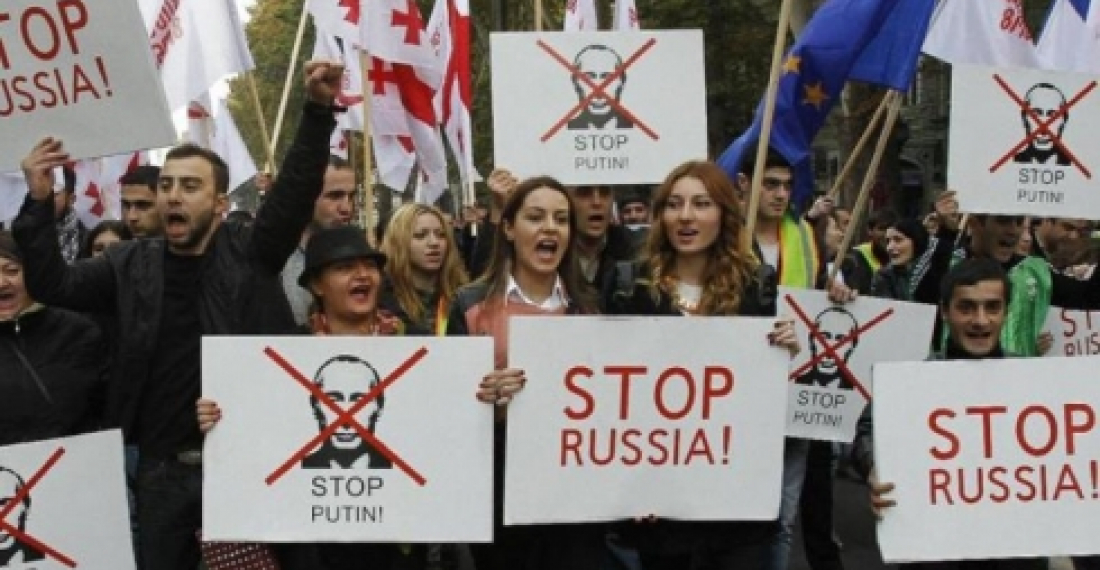Crowds thronged the main thoroughfare of the Georgian capital Tbilisi on Saturday (15th November) to protest alleged Russian attempts to 'annex' the break-away territory of Abkhazia. The demonstration, which was organized by the opposition United National Movement (UNM) party of former president Mikheil Saakashvili, also criticized what it called the current government's "collaborationist" policies.
The opposition announced plans to hold a rally last month, in reaction to a Russian-proposed treaty for "alliance and integration" with Abkhazia. The draft treaty provides for joint Russian-Abkhaz initiatives in defence and law enforcement, as well as measures to integrate Abkhazia into the Russian Federation's healthcare and social security system.
The publication of the draft treaty sparked condemnation in Tbilisi, with the Georgian parliament adopting a statement objecting to Russia's "attempt to annex occupied Abkhazia". The statement was not supported by the UNM parliamentary minority, however, which proposed its own resolution calling for Georgian withdrawal from informal bilateral talks with Russia.
Led by UNM lawmakers and joined by supporters from other parts of Georgia, protesters marched from Rose Revolution Square to the old parliament building on Rustaveli Avenue in the centre of Tbilisi. While some carried Georgian, EU and American flags, others waved placards with slogans such as "No to Annexation!" and "Stop Russia!" A large NATO flag was unfurled by demonstrators opposite the parliament building, and several waved the banner of the UNM-led protest group Free Zone.
UNM MP Giorgi Gabashvili slammed the authorities as "collaborationst", telling the assembled crowd that the government is "deceiving itself, its own people and the entire world as though [Georgia] were busy mending relations with the occupiers [ie. Russia]."
Former President Mikheil Saakashvili, who is facing a criminal investigation in Georgia for exceeding powers, addressed the crowds via video link from Kiev saying that "the whole nation must stand together before it is too late and must loudly tell Bidzina Ivanishvili that it does not share his dream."
A coalition of several political parties, led by businessman Bidhzina Ivanishvili unseated Saakashvili's UNM in parliamentary elections two years ago, and has attempted to defrost relations with Russia through informal dialogue, as well as pursuing a vigorously pro-Western foreign policy aimed at integrating Georgia into NATO and the EU.
"I've come to say no to annexation, no to Russia and no to this policy of compliance that is in full swing in Georgia" said Giorgi, one of the protesters gathered in central Tbilisi. "My wish is for Georgia to be united and Abkhazia to be returned" said another protester, Khatia.
The former head of Saakashvili's presidential administration, Andro Barnov, told Commonspace.eu that the Russian-Abkhaz draft treaty amounts to "effective annexation of our land" and is something Georgians will "never tolerate". He criticized the government for not having a "principled position" and for "not protesting what Russia is doing".
Estimates of the number of protesters on the city streets range from a few thousand to 'tens of thousands'. Russia's annexation of Crimea in March this year - as well as its continued support to separatist rebels in Eastern Ukraine - have unsettled many in Georgia, who believe Russia is attempting to annex its break-away regions of Abkhazia and South Ossetia. Both territories declared independence with Russian backing after the August War of 2008 and both governments - which are recognized by only a handful of foreign states - are heavily dependent on Russia for financial and military support.
source: Joseph Alexander Smith reporting from Tbilisi for commonspace.eu
photo: UNM supporters at a protest rally in Tbilisi on Saturday, 15 November 2014.







